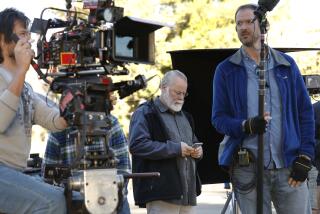Many shows could take weeks to roll after the walkout ends
If the writers strike ended today, Hollywood would not immediately return to its regularly scheduled programming.
The risk of irreparable damage to the current and upcoming television season increases with each day the walkout continues. Still, there were no tangible signs of progress Tuesday, when negotiators for writers and the studios returned to the bargaining table for their second full day of talks since the strike began more than three weeks ago.
Although major differences divide them, the parties agreed to meet again today. The seriousness of the sessions has raised hopes that a deal could be reached before Christmas.
Even if that happens, however, Hollywood would not be back at work until after the holidays.
Before writers can pick up their pens, they may have to wait a week or more between the time when the Writers Guild of America’s board approves a new three-year contract and when its members formally vote on the deal.
Then writers are up against their traditional two-week hiatus in December, when networks rely heavily on reruns. That could prompt many writers to work through the holidays to complete scripts so that shows can start shooting again in January.
Writer-producers and studio executives estimate that it could take three to five weeks to resume production of dozens of television shows that have shut down. Many shows have run through their scripts, and some have only outlines of future episodes.
Further, it’s unlikely that studios would start production again until they had several scripts in hand for a given series, as a way to avoid costly starts and stops.
Another factor that could slow down the process is that some crew members have found work elsewhere to make ends meet and may not be available to return to their old jobs.
“Resuming production isn’t something that can happen overnight,” said Pam Veasey, an executive producer of “CSI: New York,” which will stop shooting Tuesday, having completed 14 of 24 episodes. “You have to write scripts, you have to find locations, you have to do casting. It doesn’t just take one week to prepare 200 crew members to film a single episode of a drama.”
Some shows will resume filming sooner than others, depending on how many scripts they completed. Late-night talk shows, including those hosted by David Letterman and Jay Leno, would be the first to return to the air with fresh material.
Situation comedies filmed before an audience, such as “Back to You,” starring Kelsey Grammer, could be up and running within seven working days, according to show co-creator Steve Levitan. The show, which shut down when the strike began, has two scripts that just need polishing, Levitan said.
In contrast, other shows, such as the ABC series “Pushing Daisies,” would take five weeks to gear up, according to creator Bryan Fuller. Production on “Pushing Daisies” ended Monday upon completion of the series’ ninth episode.
Fuller pointed out that even when the strike ends, show runners still face the possibility of a shortened season and cancellation of their series.
If a deal happens soon, the strike’s effect on the local economy will be insignificant, experts say.
“If the strike ends by year’s end, the overall impact on the L.A. economy is going to be minimal,” said Jerry Nickelsburg, an economist with the UCLA Anderson Forecast.
In a study to be released today, Nickelsburg estimates that the strike could cost the local economy $380 million if it lasts as long as the 22-week walkout by writers in 1988. That’s far below the roughly $1-billion estimate by the Los Angeles County Economic Development Corp.
Nickelsburg said that although the strike was hurting thousands of production workers who were thrown out of work, most of the job losses are temporary. He also noted that production losses from TV shows shutting down were mitigated by growth in reality TV and other unscripted programs unaffected by the walkout.
Jack Kyser, chief economist with the LAEDC, agrees that if the strike ends soon the damage will be limited. However, he stands by his $1-billion estimate in a protracted strike.
“We think it’s a reasonable estimate,” Kyser said, citing the scores of businesses that indirectly feed off the entertainment industry, which he said contributed nearly 7% -- an estimated $30 billion annually -- to L.A. County’s $442-billion economy.
Whatever the cost of the strike, writers just want it to end.
“I’m going to choose to remain optimistic,” Levitan said of the current negotiations. “I don’t understand why this deal would take weeks to make while there’s so much at stake.”
--
claudia.eller@latimes.com
Times staff writers Maria Elena Fernandez and Meg James contributed to this report.
--
On latimes.com
Writers strike
For the latest on the Writers Guild’s work stoppage, read The Times’ continuing coverage at latimes.com/hollywoodwriters. Find out the status of your
favorite shows at
latimes.com/thetvgrid.
More to Read
The complete guide to home viewing
Get Screen Gab for everything about the TV shows and streaming movies everyone’s talking about.
You may occasionally receive promotional content from the Los Angeles Times.







